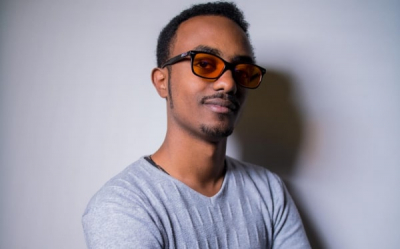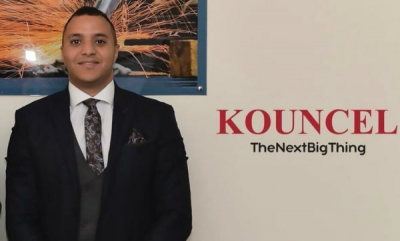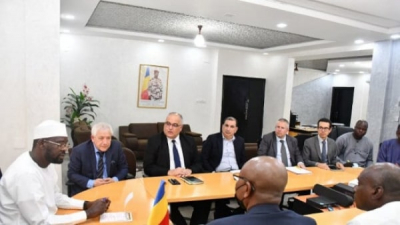For many development agencies, e-commerce is now one of the key factors that will boost Africa’s post-Covid-19 recovery. The momentum generated by the pandemic attracted investors from all horizons to the sector, which is growing day in and day out.
Four Cameroonians launched Kuruba.cm, a wholesale e-commerce platform last week. They are namely Pierre-Lionel Ebe, Ivan Kharl Manga, Armel Fotso, and Simon Mbelek. All four are former employees of Jumia Cameroon, which ended its operations in Cameroon in November 2019. Through Kuruba.cm, they aim to help retailers quickly source their products from reference brands and get them delivered anywhere they like in Cameroon.
“We launched Kuruba to help retailers, who are crucial parts of our daily lives, to access millions of products at better prices than what they are currently offered. We connect independent merchants with a wide range of suppliers, allowing them to easily buy their products,” explains Pierre-Lionel Ebe, CEO of the eponymous start-up that launched the e-commerce platform.
In Cameroon, there are currently thousands of supermarkets, stores, and small shops that usually turn to wholesalers, resellers, distributors, and producers to acquire their merchandise. Kuruba.cm wants to facilitate this costly and time-consuming task by allowing them to quickly contact producers and distributors.
With its online platform, the startup is positioned in a market segment with high economic potential in Africa. In Morocco, chari.ma has been doing the same thing since January 2020, with much success. For instance, it claims nearly US$2.5 million orders processed monthly. In January 2022, it was valued at US$100 million.
In Cameroon, Kuruba.cm has a warehouse and large storage facilities, and pickup points to reduce delivery time and costs. To quickly attract clients, it unveiled an aggressive commercial policy. For instance, the startup promises free delivery for orders exceeding XAF100,000 (US$164.66). It also announced discussions with financial partners to allow clients to obtain supply credits they can pay after 30 days.
Currently, the startup claims over 200 reference brands in categories like household appliances, agri-food, cosmetics, and home maintenance. Its ambition is to expand out of Cameroon once it consolidates its presence in the country.
“We are only at the beginning of the adventure because the African e-commerce market is growing exponentially and Kuruba wants a large share of that market. We want to offer an innovative, convenient and affordable online service for African retailers and help them meet their customers’ daily needs,” said Pierre-Lionel Ebe.
Muriel Edjo
In the wake of the ongoing digital transformation in Africa, local startups are developing solutions to facilitate the discovery of their culture and tourist attractions. Tabaani is one of those startups.
Tunisian startup Tabaani allows private individuals (called hosts) to organize, through its eponymous platform, tours in regions with tourist potential. It was founded in 2020 by Hamza Moussi (photo), Moukim Hfaidh and Wiem Ben Mahmoud. Early this year, the startup completed a US$120,000 funding round to support its expansion.
Tabaani aims to provide tourists with a tailored experience and help them avoid tourist traps. For Wiem Ben Mahmoud, Tabaani cofounder, the startup allows tourists to travel “off beaten paths,” meet new people and discover new cultures. “It is more than mere tours, it is an immersion in local culture: a highly emotional experience,” she explains.
On Tabaani, hosts can organize all sorts of tours, be they bike tours, car trips, food tours, or visits to historical places as a way to share lifetime memories and meet people from various backgrounds who share the same passion. The price of each of the tours is set by the hosts. It is then up to tourists to select the tours they are interested in to customize their own traveling experience. Tabaani even has a rating system to let tourists discover the most rated hosts, who are called ambassadors.
In 2020, the e-tourism platform was selected as the best solution for external use during the first national "OpenGovDataHack2020" hackathon organized by the Tunisian Ministry of Public Service in partnership with the World Bank. The value of the award was DT3,000, about US$1,000.
Adoni Conrad Quenum
It is still difficult for African video game publishers to effectively market their games in local markets. Strategic partnerships between actors of the ecosystem are rare but, the partnership between Ethio Telecom and Qene Games may be a breakthrough.
Ethiopian video game publisher Qene Games, on Monday (April 11), signed a partnership agreement with Ethio Telecom to facilitate access to its games for local users. Thanks to the agreement, Qene Games will leverage the telecom operator’s fintech solutions to ease users’ subscriptions and in-app purchases.
For Dawit Abraham (photo), Qene Games CEO, " Africa has a great potential to become a major games exporter and compete in the global creative and entertainment industry. However, the first step we need to take to make this a reality is to give African creators easy access to sell their content in the African market.”
Considered the first video game publisher in Ethiopia, Qene Games has developed games like Kukulu, Gebeta, and Feta, inspired by African art and characters. In 2021, With its first two games, Kukulu and Gebeta, Qene Games won the best entertainment app and best app of the year award at Apps Africa Awards.
The subscription and purchase models envisaged in the partnership agreement will be tested on Kukulu, which is a popular game available in four local languages. The game follows the adventures of a chicken running from its farmer.
Once successful, Qene Games will eventually include its whole game catalog, therefore making the first moves towards its dream to conquer the African market.
Qene Games and Ethio Telecom’s partnership comes just weeks after ten African game publishers formed a continental alliance called Pan African Gaming Group (PAGG). The alliance aims to create more monetization opportunities and jobs in the African gaming market.
Ruben Tchounyabe
Less than two months after its launch, Kouncel has already piqued the interest of many investors. With his online training courses, the founder wants to contribute his over five years of practical experience to making legal concepts understandable for everyone.
Ibrahim M. Saleh (photo) is the CEO of edtech Kouncel. A law graduate from the University of Cairo, he co-founded Kouncel in February 2022 to provide legal online training and courses on various topics like arbitration, corporate law, and intellectual property.
On February 28, Ibrahim Saleh successfully raised US$1.2 million from the African Development Bank, the Academy of Scientific Research and Technology (ASRT), the Egyptian Entrepreneurship Development Project (Tanmia wa Tatweer), and Zaldi Capital. The funds raised will allow Kouncel to scale its services in the MENA region.
Ibrahim M. Saleh created Kouncel to help companies and lawyers active in the MENA region better understand legal concepts and their specificities. He sees Kouncel as his contribution to the development of his native country, Egypt.
“Education forms a key part of Egyptian Economic Vision 2030, and law plays an important role in creating a healthy environment for businesses and pushes FDIs forward. And we aim to provide a highly sophisticated education experience to everyone in the legal field which will positively impact the ecosystem,” he says.
Before Kouncel, Ibrahim M. Saleh founded MLP Legal Academy in 2016 with Mohamed Adel. The educational institutions offers legal training programs to individuals and businesses. With technology, Ibrahim Saleh is reaching a wider audience.
Melchior Koba
Trella entered the Egyptian market in 2018. Within years, it expanded to Saudi Arabia and Pakistan with hopes to enter every MENA country with support from leading investors.
Trella is an e-logistics platform launched by its eponymous startup, in 2018, in the Egyptian market. The platform, available on playstore, acts as a network connecting shippers with transporters and even goes an extra mile to resolve issues that may arise between the two parties. In June 2021, Startup Trella successfully completed a US$42 million funding round thanks to its innovative business model.
Founded by Muhammad El Garem, Ali El Atra, and Omar Hagrass, the startup aims to improve efficiency and reliability in the trucking market. “The cost of moving goods in Egypt is two to four times more expensive than it is in Europe and the US,” said Trella’s CEO, Omar Hagrass. For the CEO, by making the sector more efficient, Trella brings costs down and wins the market.
Before Trella, “carriers used to make hundreds of phone calls every day just to be able to take one load. (...) Sometimes, they would spend three to five days idle because they did not have anyone to assign them any loads,” he added.
In addition to its reliability and transparency, Trella also allows shippers to track their shipments in real-time. It also provides key transportation trends and performances.
To access the various services offered by Trella, users either register online or via the mobile app. Then, they can fill a set of information to be informed about everything needed for their loads to reach the started destination.
By 2021, Trella was already employing 100 people. At the time, it claimed more than 350 shipping partners and more than 15,000 carriers on its platform. With automated dashboards and 24/7 customer service, the platform is keeping up with the competition. Its next step is to expand in the whole MENA region.
Adoni Conrad Quenum
In 2020, the Chadian government launched its 10-year digital development strategy. To ensure the successful implementation of that strategy, the country is signing strategic partnerships for high-impact contributions.
The European Investment Bank (EIB) recently approved financing for the digitization of Chad’s public services and the deployment of the country’s information system. The approval was disclosed by Chadian ICT Minister Idriss Saleh Bachar, last April 11, during an audience he granted to Deloitte and TACTIS experts. The experts were commissioned by the EIB to carry out the feasibility studies of Chad Digital Transformation Project, which includes the two components mentioned above.
According to Minister Idriss Saleh Bachar, the EIB plans to invest €150 million in the project, which also includes the extension of telecom access in rural areas, an essential component for digital inclusion.
The financial support falls within the framework of a cooperation agreement signed by Chad and the EIB, in December 2020, to accelerate digitization and rural connectivity. During the signing ceremony, Idriss Saleh Bachar explained that “high impact digitization investment” was “essential to boost (...) economic growth and social progress in landlocked Chad.”
The December 2020 agreement was signed five months after the Chadian government validated its 2020-2030 strategic digital development plan, during a workshop held from July 15 to 16, 2020.
With the deployment of its information system, Chad wants to improve the efficiency of collaboration between its institutions. Meanwhile, the digitization of public services is expected to enhance the quality of services it offers citizens.
Ruben Tchounyabe
Meshack Alloys (Photo), founder of Sendy, a Kenyan e-logistics platform, wants to facilitate trade with new technologies. The startup he launched in 2015 is already operational in several African countries.
His passion for technology goes back to childhood. At 13, he started learning computer programming at the Laser Hill Academy and the Institute of Software Technology. He then studied at the University of Nairobi’s College of Architecture and Engineering (CAE) and went on to found his first start-up, Merlloyds Technologies, in 2008. After this start-up was bought by advertising agency Multimedia Mobile Ltd, he created another one in 2011: MTL Systems–a software company that focuses on logistics, transportation, and finance.
“Making my first million had to be my ‘aha moment’. I knew right there and then that I wanted to spend time in the tech space and not anywhere else. Not just because of the money, but also because of the significance and impact of what I was building,” Meshack Alloys said in an interview in 2021.
In 2015, realizing the fragmented state of the logistics market, Alloys left MTL Systems to co-found Sendy with colleagues Evanson Biwott, Don Okoth, and Malaika Judd. From that point on, his stated mission has been to provide a better user experience for clients in the logistics industry. To successfully achieve this goal, the entrepreneur created a last-mile delivery and logistics service platform. Dubbed Sendy networks, the platform connects clients to drivers, easing package delivery.
What started in 2015 as a small packages delivery platform (using motorcycles and tricycles) quickly expanded to add pickup and truck delivery services.
The platform, which claimed some 30,000 users by 2020, serves Kenya, Uganda, and Tanzania. Its clients include large corporations like Unilever, DHL, Toyota, Jumia, Safaricom, and CFAO. For the startup’s expansion, in 2020, Meshack Alloys and his co-founders successfully raised US$20 million in a Series-B investment round led by Atlantica Ventures.
The funds helped accelerate Sendy’s growth. In late 2021, Meshack Alloys announced Sendy’s participation in the Series A funding of Kamtar International, an e-logistics startup operating in Côte d'Ivoire and Senegal. In the short term, the entrepreneur's ambition is to gradually expand beyond the East African market by positioning Sendy in West Africa.
Aïsha Moyouzame
After four years of professional career, Uka Eje traveled abroad to sharpen his skills to efficiently meet the needs of the more than 200,000 farmers he assists.
Uka Eje was born and raised in a farming community in Benue State, Nigeria. Though he found his passion for agriculture quite early, the man who birthed agritech Thrive Agric started committing to farmers between 2012 and 2016. During this period, Eje was working at Royal Impact Corp, “a social enterprise that builds systems around the food, agricultural, and technological sectors and aimed at solving the daily challenges faced by a targeted community. There, he grasped the many opportunities agriculture could offer if proper practices were implemented.
In 2016, the Nigerian entrepreneur co-founded Thrive Agric with Ayodeji Arikawe to improve the living conditions of smallholder farmers.
Leveraging technology, Thrive Agric collects and analyzes farm management data to make smallholder farmers more productive, notably by devising personalized financing, farming, and marketing plans.
To be more useful to farmers, Uka Eje enrolled in food production courses at the University of Reading, and Innovation courses at Leeds University between 2016 and 2017.
In March 2022, Uka Eje successfully raised US$56.4 million to expand the operations of his startup, which was claiming more than 200,000 farmers in his client base at the time. His expansion targets are notably Ghana, Zambia, and Kenya. “The new investment takes us one step closer to fulfilling our mission of building the largest network of profitable African farmers using technology to ensure food security,” he said after the fundraising operation.
To date, Thrive Agric has funded more than 15,000 farmers across 20 states in Nigeria. The achievement earned Uka Eje various awards, including the 2018 Young African Leaders Initiative (YALI) award. He was also featured in Forbes’ Top 30 under 30 Most Promising Africans in 2019. The same year, Thrive Agric was selected to participate in the Y Combinator Winter 2019 batch and the Go Global Africa fund, in the Google Developers Launchpad. In 2021, Africa CEO Summit named Thrive Agric one of Africa’s most promising startups.
Melchior Koba
In Egypt, 40% of deliveries fail. This is four times higher than the global average, which is about 8%. Concerned by the situation, several local entrepreneurs have been trying to deal with this challenge which plagues a sector that is worth about US$3.1 billion in the Middle East and North Africa (MENA) region.
ShipBlu is a digital platform that provides last-mile delivery services in Egypt. It fulfills orders not only from individuals but also from online shopping platforms and local stores. It was co-founded in 2020, by Ali Nasser (photo, center), Ahmed ElKawass (photo, right), and Abdelrahman Hosny (photo, left). In October 2021, the startup completed a US$2.4 million funding round, with investors including Nama Ventures and Orange Ventures, to improve its services and support expansion.
The idea for ShipBlu came from Ali Nasser’s realization of the state of delivery services in the country. “Roughly 56% of the time when someone in Egypt places an order online, they don’t even get a delivery date. After you place your order and you get an email confirmation, it’s complete silence until, on a random day, you’re going to get a call from the agent who’s on their way to you asking if you are available to pick up the package. We’re changing that,” he explains.
To change things as they put it, ShipBlu founders created a platform allowing users to access marketplaces and online stores of partner brands operating in Egypt. The partners usually have stocks in ShipBlu’s warehouses to allow the startup to quickly deliver placed orders. Right from their ShipBlu dashboards, users can monitor the status of their orders.
The startup, accelerated by Y Combinator, usually delivers orders within three hours and users always have an idea of when they will receive their packages.
Deliveries are billed per the size of the package, the delivery time frame selected, and the destination. The startup claims to have developed an Artificial intelligence and machine learning algorithm to “reduce costs, meet delivery constraints and refine its operating assumptions.”
ShipBlu’s system improves the quality of the services offered by online shopping platforms in the country despite addressing problems that arise due to inaccurate or non-existent postal codes.
Adoni Conrad Quenum
In the previous decade, the Kenyan government made significant investments to transform the country into a digital hub in East Africa. With the new plan, it is setting higher goals.
Kenya's Minister of ICT, Joe Mucheru (photo), launched the National Digital Master Plan 2022-2032 on Tuesday, April 12. Launched on the sidelines of the Connected Kenya summit being held from April 10 to 14 in Diani, the about US$45 million master plan will guide the government’s investments in digital transformation over the next ten years.
“The National Digital Master Plan, which will be launched will guide us in shaping our discussions towards a transformed digital Kenya where technology plays a pivotal role in economic development. (...) I do not doubt that with the successful implementation of the identified programs and projects in the master plan, this country can live up to its reputation as the Silicon Savannah in matters of ICT and economic development,” indicated Joe Mucheru.
According to the master plan, by 2032, Kenya will deploy, 100,000 km of fiber optic cable to connect 40,000 schools and other educational institutions, 20,000 government institutions, and 13,000 health facilities. The country will also install 25,000 Internet access points to support its youth and innovators and create 1,450 digital innovation hubs, two software factories, and two electronics manufacturing plants. Overall, the plan will help create 10,000 jobs for software engineers.
The master plan strongly emphasizes digital skills development by building the capacities of 20 million citizens, 300,000 civil servants, and 10,000 professionals.
On the regional level, it is agreed to establish a hub on future technologies and another dedicated to the maintenance of submarine cables.
“To position the country as a regional ICT hub, the plan proposes the establishment of regional ICT smart hubs as well as regional submarine cables maintenance depots. (...) To enable a one-stop-shop for all government core services, the plan proposes accelerated automation and digitization for all government core services in both national and county governments” to quickstart the digitization of 5 billion government records, ICT Minister Joe Mucheru indicates.
Ruben Tchounyabe
More...
For a long time, many public actors have launched health platforms that did not help efficiently take care of patients across Morocco. Now, the government wants to change things, as it is more concerned about inclusive healthcare.
During a public communication on Saturday, April 9, Khalid Ait Taleb (photo), the Moroccan Minister of Health and Social Protection, announced the upcoming launch of a national e-health system. It will provide citizens equal access to health records and other online services.
Through the new platform, the government wants to put an end to the existing fragmented e-health system, set up by university hospitals, regional health authorities, and various national health programs, said Khalid Ait Taleb. Indeed, nationwide, two programs have established electronic platforms: the National Maternal and Child Health Program and the Tuberculosis Program.
The idea of an integrated national e-health system is a recommendation of the Mohammed V University of Rabat. In a summary report on e-health in Morocco prepared by its e-health innovation center, the academic institution assessed the national health system and identified opportunities and challenges for e-health solutions that match the digital transformation strategy undertaken by the government over the past 20 years.
According to the Minister of Health and Social Protection, during the Covid-19 crisis, innovative e-health solutions boosted the resilience and responsiveness of the country's health system. The official added that telemedicine and online access to health services are in line with the country's legal framework for the protection of personal data and the practice of medicine.
Ruben Tchounyabe
Alexandre N'Djore (photo), on March 10, 2022, successfully raised €300,000 in seed funding to develop his startup Digitech Group. Founded in 2016 with Zachariah George, the startup specializes in insurance technology solutions. Digitech Group offers insurance and reinsurance companies a set of fully integrated, cloud-based web and mobile solutions to improve their productivity and competitiveness.
Digitech Group was founded after Alexandre N'Djore noticed the fragmented and broken state of the insurance sector in Africa. According to the former MTN Côte d’Ivoire’s logistics manager, the problem affects the whole sector, right from insurers to policy buyers. " This leads to a generally low insurance penetration in Africa, about 3%, except for South Africa,” he says.
For its new development phase, Digitech Group created Hyperion 2.0, an ERP system that automates transactions between insurers and reinsurers, saves time and money, eliminates errors, and provides real-time critical business information.
Alexandre N'Djore holds an MBA from the Hult International Business School in Dubai. He also obtained a Master's degree in supply chain and transport engineering from Ecole Supérieure de Commerce et d'Administration des Entreprises (ESCAE) in Abidjan. The Master’s degree opened doors to executive positions in supply chain logistics for him. For instance, for four years, he has been the director of catering at Air Ivoire.
His ambition is to transmit the operational efficiency he acquired during his professional career in the supply and logistics chain to the African insurance sector. Since the creation of Digitech Group, the tech entrepreneur claims to have processed more than 7 million insurance policies. His dynamism earned him numerous awards, including the best Insuretech Award, offered in 2020, by the Federation of African National Insurance Companies (FANAF). In 2018, Digitech Group won the Best Startup award in South Africa, by Amazon Web Services at the AWS Startup Day.
Melchior Koba
Mobile operator Orange Egypt recently signed an exclusive 5-year partnership agreement with electronic payment network VISA. The agreement officially announced on Twitter, Tuesday, April 12, aims to provide Orange Cash clients with exclusive digital payment solutions through VISA virtual and physical bank cards.
Thanks to the partnership, Orange Egypt’s clients can make online and in-store transactions using Visa’s various payment services (both domestic and international services) right from their mobile money wallet (Cash wallet). It will also allow merchants to accept transactions via the digital wallet just by scanning QR Codes.
The partnership signed by Orange is in line with its commitment to “provide unique and innovative features to facilitate clients’ daily transactions as well as save them time and energy.” It will thus help Orange Egypt's clients carry out financial transactions in a simple, fast, efficient, and secure manner. It will also help the operator attract new customers and improve its position in the digital payment market in Egypt.
For VISA, the initiative is part of plans to "diversify payment methods, encourage digital payments, and support Egypt's evolution to a cashless society." In May 2017, the electronic payment network signed a memorandum of understanding with Egyptian authorities to develop the infrastructures needed to transform the country into a regional digital payment hub. So, Visa Inc. will capitalize on the "extraordinary opportunity" offered by the new partnership to pursue its growth ambitions.
Overall, the exclusive deal will contribute to Egyptian authorities’ efforts to move to a cashless society as the country is, since 2016, engaged in a digital transformation process, which was accelerated by the Covid-19 pandemic.
Isaac K. Kassouwi
Afrikamart is a Senegalese fresh produce distribution startup that offers its marketing services to agri-food producers. It has an online platform where merchants, hotels, restaurants, and supermarkets can buy their fresh products. Launched in 2018, Afrikamart was founded after Mignane Diouf, its founder, noticed that it was easier for retailers to import fruit and vegetables from Morocco than to buy them locally in Senegal.
The startup collects fresh products from thousands of producers in rural areas for distribution to retailers in urban areas. In doing so, it guarantees better incomes for farmers, better prices for retailers, and quality products for end consumers.
To become Afrikamart suppliers, producers fill in contact information to allow the startup to reach out for more information about their products and whether they can be sold on the platform.
Clients also have to follow a set of procedures like the products they are willing to buy and which quantity they are planning to buy weekly.
Afrikamart claims to have delivered 8,000 kilograms of products daily in 2021 and created 200 indirect jobs thanks to the collaboration with more than 600 agri-food producers. Its long-term plan is to expand into more West African markets by building on the supply chain expertise and the success it acquired in Senegal.
Adoni Conrad Quenum















